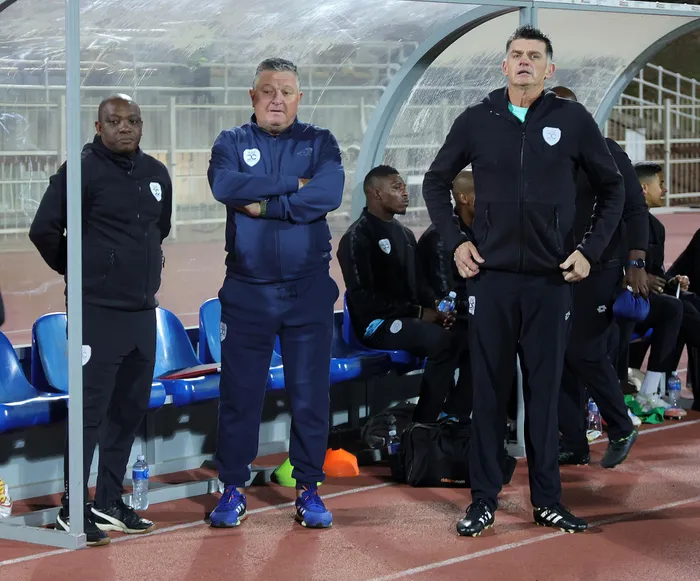
The Durban City braintrust of assistant coach Pitso Dladla, from left, head coach Gavin Hunt, and goalkeeper coach Rowen Fernandez will arguably target cup success over a league challenge this season. Photo: Backpagepix
Image: Backpagepix
Durban City coach Gavin Hunt has been quick to point out that his team’s impressive run in the early stages of the Betway Premiership has come without sweeping changes to the side that carried them through the Motsepe Foundation Championship.
It is a point of pride for Hunt, who has trusted a core group of players to make the step up to the elite level, and so far, the gamble has paid off.
That consistency has given Durban City a rare cohesion into the Premiership, but with the Carling Knockout Cup looming, the question now shifts to; can a youthful, relatively untested side transfer their league form into a knockout environment where the stakes are immediate and unforgiving?
Unlike the Premiership's marathon grind, cup football is about moments—moments of resilience, of composure, and often, of luck. Durban City’s squad, while lively and fearless, is still relatively young and new to the pressures that come with the situation of 'one game decides everything'.
The Carling Knockout Cup, formerly known as the Telkom Knockout Cup, has long been a stage where experience is crucial. Penalty shootouts, tactical discipline, and the ability to stay calm under immense pressure are as important as attacking flair.
For Durban City, this will be their first taste of that cauldron. The manner in which they have handled Premiership opponents so far—showing structure against the big clubs, energy against mid-table sides, and fight when games look beyond them—suggests a readiness to face such a test. But whether that blueprint, born out of the grind of the MFC, is durable enough for knockout football remains to be seen.
Hunt himself knows all about the unforgiving nature of cup competitions. His record in the Carling Knockout, going back to its Telkom Knockout days, is mixed. While he has enjoyed deep runs, including a memorable title with SuperSport United in 2014, he has also seen campaigns end abruptly at the hands of more experienced or ruthless sides.
The challenge for him at Durban City will be balancing the enthusiasm of youth with the tactical pragmatism required to win cups.
That balance could well define their journey. The team’s younger players have so far shown no fear against established PSL giants, and their energy could be a decisive factor against opponents who may underestimate them. However, Hunt will know that youthful exuberance can quickly become a liability in knockout football, where one mistake can erase ninety minutes of hard work.
“We haven’t gone and signed ten new players. The bulk of this side is the one that worked hard in the NFD (National First Division/MFC) last season. That foundation is what’s keeping us competitive now.”
“The blueprint from the NFD (MFC) has served us well. These players know each other, they trust each other, and they’ve shown they can handle themselves against top-flight opposition," Hunt said after the recent draw against Stellenbosch away.
The upcoming Carling Knockout Cup will therefore serve as a unique measuring stick. Success in the competition would not only confirm Durban City’s potential but also accelerate their growth, proving they can manage different formats of competition at the highest level. Even a narrow defeat, if the performance shows maturity, could be considered progress in their first attempt.
What makes this test particularly intriguing is that Durban City are not entering the cup as no-hopers. Their PSL form has already ensured that they will be respected, if not feared, by opponents. That respect is crucial—teams are less likely to take risks against them, giving Hunt and his players the chance to dictate games on their own terms.
In many ways, the Carling Knockout Cup will be less about results and more about answers. Can a young, tightly knit team with NFD success translate their blueprint to the high-pressure, do-or-die environment of cup football?
Related Topics: